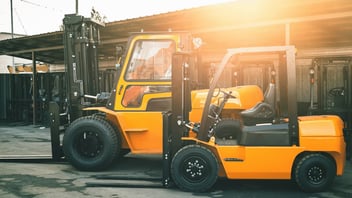Construction equipment is the backbone of most job sites, doing all the heavy lifting that makes our jobs just a little easier. Like your crew members and employees, construction equipment needs to be cared for and maintained. These machines are at risk for overwork just like their human counterparts.
What red flags should you be on the lookout for to indicate that your team is overworking construction equipment? Here are five signs:
1. Low Fluid Levels
If the human body is low on water, it won’t function correctly and, over time, severe dehydration can cause numerous problems. The same thing can happen with construction equipment, and for both types of examples, perpetually low fluid levels can indicate your equipment is being overworked.
Sometimes this will manifest as visible leaks on the ground or pavement beneath the equipment, but in other cases, it might not be as obvious. If you’re losing fluids but there aren’t any visible leaks, it could indicate there is a larger problem in play or the equipment is getting overworked.
2. Strange Sounds
Sometimes, understanding that your team is overworking your equipment is as simple as using your ears. Each piece of equipment has its own unique voice, and under normal circumstances, that voice won’t change much.
If your equipment starts making noises out of the ordinary, it’s a good sign — or rather a bad one — that there’s a problem and your equipment might be getting overworked. It’s no different than the human tendency to scream colorful expletives when you stub your toe or get injured.
3. Frequent Breakdowns
Construction equipment breaks down. It’s just a part of life, especially if you consider the regular wear and tear the machinery endures every day. You need to monitor these breakdowns and pay close attention to their frequency. If a piece of equipment starts breaking down more often than usual, this is a big red flag that it’s being misused or overworked.
This applies to attachments and add-ons as well — if they’re breaking down much sooner than they should, it’s a sign that your equipment isn’t being used correctly. Your team should research the proper care of all equipment parts to ensure the longevity of expensive machinery.
4. Warning Lights
Dashboard warning lights can be an annoyance, especially if they light up when you’re in the middle of something, but they convey a lot of essential information you shouldn’t ignore. They can indicate everything from major problems to something as simple as a clogged air filter.
If the warning lights start lighting up with increased frequency, it’s a sign your equipment is getting overworked. Overwork causes breakdowns, which in turn causes more warning lights to illuminate. On this same point, make sure no one ignores or conceals dashboard warning lights when these things turn on. These warnings should always be addressed as quickly and efficiently as possible.
5. Exhaust Changes
Most people don’t think much about the exhaust their equipment generates, except maybe to complain about the smell, but the color and consistency of equipment exhaust can tell you a lot about the engine health. In most cases, a healthy diesel engine will generate mostly colorless exhaust.
Black smoke means the fuel-to-air ratio is off, with more fuel getting burned in the engine. White smoke in the exhaust signals there is too much unburnt diesel fuel in the mix, and blue smoke is caused by burning oil. All three can indicate something is wrong with your equipment, perhaps resulting from overwork.
Train Your Team to Protect Your Construction Equipment
The easiest way to protect both your investment and your fleet is to ensure each piece of equipment is used as intended. The symptoms of equipment overwork might not be immediately apparent, but they can sneak up on you. Then, you must deal with broken equipment, expensive emergency repairs and costly downtime.
Take the time to learn and understand these red flags and be on the lookout for them when you’re inspecting and maintaining your fleet. Heavy construction equipment isn’t much different than the humans operating it, in that it needs to be cared for and occasionally given a break. Prevent big problems in the future by maintaining construction safety with your fleet and keeping your team from overworking both the equipment and themselves.
If you're eager to discover how Ving can enhance safety and compliance in your workplace, we invite you to complete the form below. Our team will promptly reach out to you to schedule an exploratory conversation.
Author
Evelyn Long is the editor-in-chief of Renovated, where she covers construction labor and safety advice for industry professionals. Readers can keep up with Evelyn’s work on Twitter.






Leave a Comment